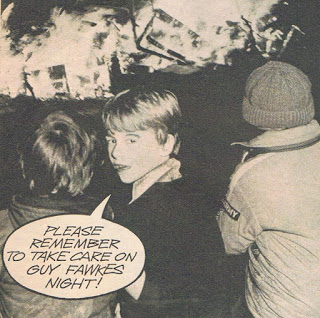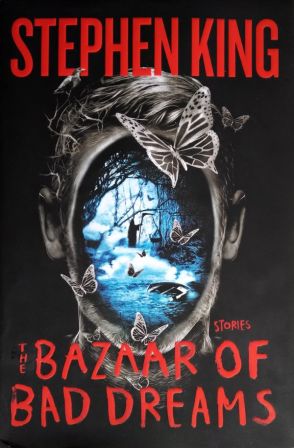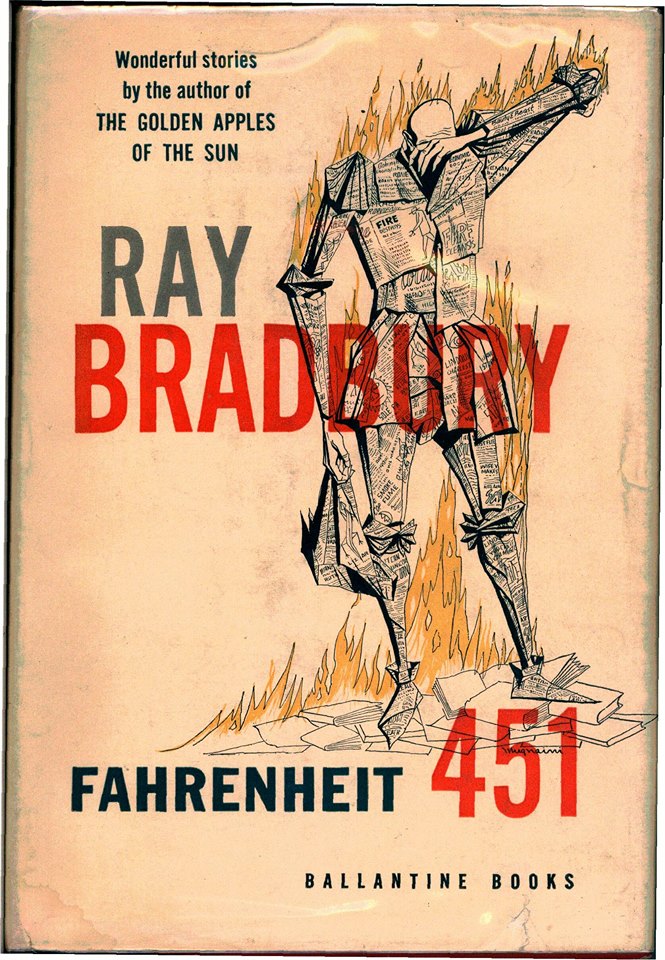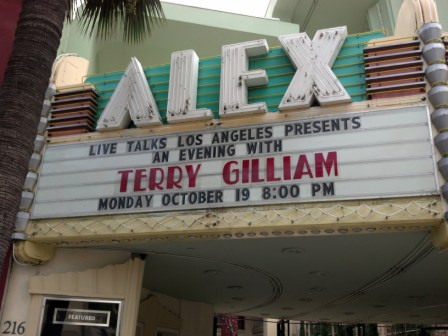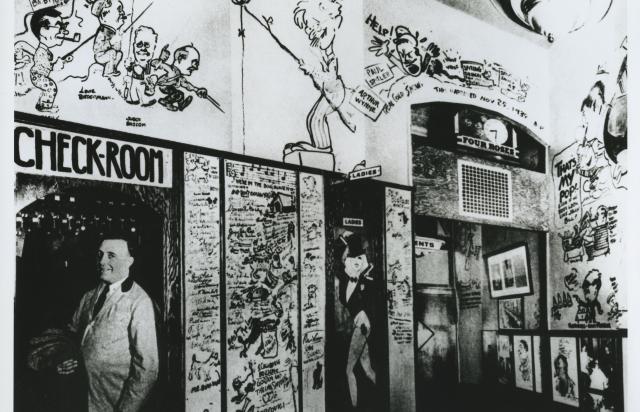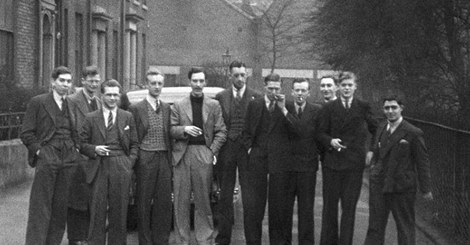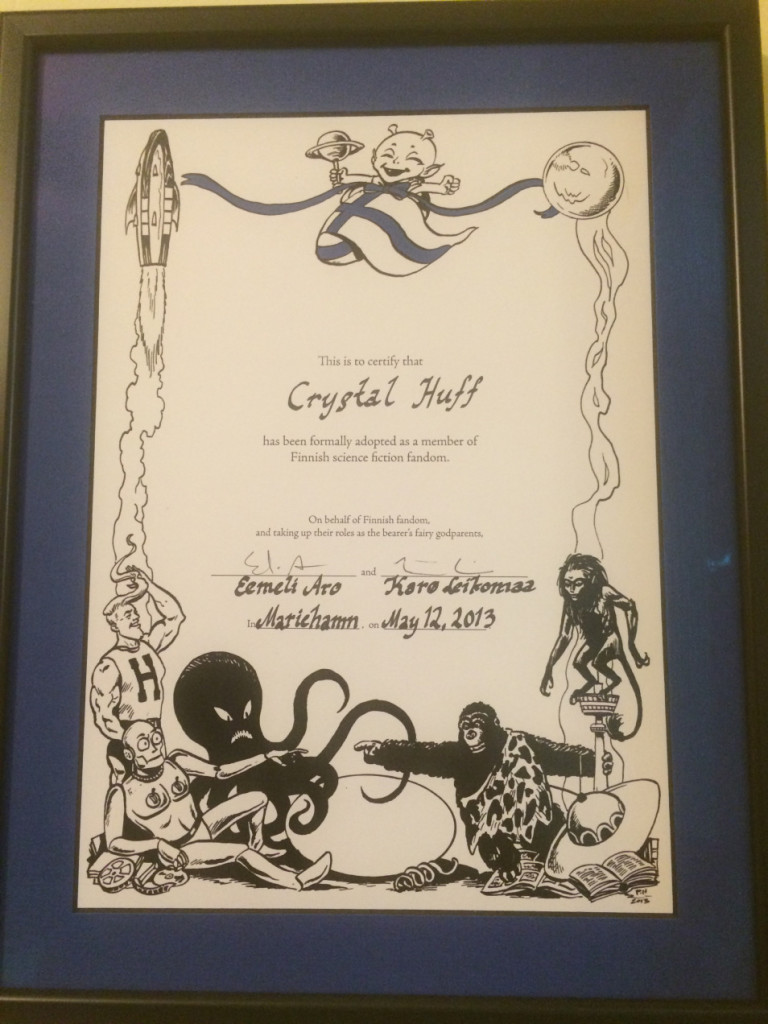(1) We begin with some choice misinformation from Charlotte Eyre’s “Five ‘no awards’ given at Hugos” on The Bookseller.
The groups [Sad Puppies and Rabid Puppies] had allegedly paid for fans to go to WorldCon to have influence over the final winners, an accusation which lead authors Marko Kloos and Annie Bellet to withdraw from the awards, despite their work being nominated.
That’s a very confused accusation, to such a degree it has to be classified as a fabrication by Eyre. The Kloos and Bellet withdrawals, of course, happened back in April. The voting for the Hugos was over two weeks before the convention, and could not even potentially be influenced by someone’s physical presence at the convention.
(2) Lou Antonelli on Facebook
Some people have said I’m mad because David Gerrold snubbed me at Sasquan. That’s not true – I’m not mad that he snubbed me, because he didn’t.
He did offer to buy me a beer, but that I guess was little more than a rhetorical flourish. I’m sure he was very busy. It think it would have made a great photo, the pair of us quaffing brews – it might have even helped show some kind of reconciliation was possible. A missed opportunity, perhaps?
Bumping into him in the hallway outside an elevator, I absent-mindedly and rather spontaneously went to shake his hand. He refused, saying “I may have accepted your apology, but I haven’t forgiven you.” Realizing my faux pas, I turned tail and took off.
That’s not a snub, that’s him exercising his personal rights. He doesn’t have to be nice to me, and he wasn’t rude, just firm. I may have other complaints about how some things were done, but a beer and handshake weren’t two of them.
(3) L. Jagi Lamplighter in a comment on “Smeagol Neilson Hayden”
Folks,
First, I think John has made it sound a bit worse than it was…but this is not his fault. I did not repeat to him all of what PNH said because I did not him to get upset during the reception. (I was afraid he would be very angry if he knew someone had sworn at his wife.)
Mr, Nielsen Hayden did shout, swear, and stomp off…but he was shouting and swearing at/about John, not at me personally and, actually, as far as swearing, he just used the phrase “tell him to shovel it up his…” You can figure out the rest.
This may not seem like swearing to many of you…many folks speak that way normally. But I do not. Nor do people normally speak that way to me.
My first thought after he stormed off was; isn’t it interesting that he yelled at the one person in the room whose only reaction is going to be to pray for him.
I was not the least upset…but I did think it ironic that, of everyone present, I was the person who got shouted at. But I suspect Mr. Nielsen Hayden knows nothing about me personally, has never read my blog, and is unaware of the irony.
(4) C. Joshua Villines – “My Thoughts On An Award I Shall Never Win”
I’m not sure how any of this helps the industry or the genre. Just because my side “won” doesn’t mean that I can’t appreciate the value of thoughtfully-articulated voices presenting a loyal dissent. If, no matter what the other side says, we cannot listen to what they have to say because of all of the ways in which they are “obviously” wrong, how will we ever hear the things that they have to say that are right? How can we move forward in a way that makes speculative fiction fandom, and SF publishing, as broadly representative of the interests of readers and the politics of writers as possible?
Step one, I think, is moving away from slates and treating the Hugos as a battleground. Perhaps this is easy for me to say, since I know I will never win one, but I think it is abundantly clear that this conflict did not change anyone’s mind, did not broaden the tent of SF at all, and did not establish a framework for dialogue. The agenda of the Sad Puppies is a minority one. The more actively and forcefully they push it, the more aggressively their peers and the genre’s fans will push back. The slate-stacking strategy failed everyone.
What might help is establishing open and honest conversations – with clear rules against strawmen and ad hominem attacks – around the three Puppy concerns I placed in bullets, above. The conversation around popular pulp versus literary art has a long history in speculative fiction, and it is no more likely to be resolved in SF than it is in cinema or television or general literature. That doesn’t mean we should stop talking about it. Should we give equal weight to David Gemmell, Jack McDevitt, Mary Robinette Kowal, and Gene Wolfe? I dearly love them all, but is the writing of one inherently superior to the others because of popularity, or accessibility, or literary sophistication?
We should also look at the books we read and tell others to read. Are there litmus tests? I know I have several. I don’t recommend books, even by authors I love, even by ones who are friends, if they contain graphic rape. Lev Grossman is a kind man with a style that makes me weep with envy, but I won’t go near The Magician King. On the other hand, despite my socialist politics, I still recommend Modesitt’s Recluce books, even though I think he’s trying to subtly convert me to capitalism. Surely most of us have litmus tests of one kind or another. Let’s be honest about them, and let our colleagues tell us what we’re missing out on as a result.
Let’s also put some thought into the value, and peril, of novelty. Speculative fiction thrives on pushing, challenging, and redrawing boundaries. It is the genre of limitless horizons, of finding new questions, of challenging old answers. Consequently, I think we should recognize that sometimes it is worth celebrating when someone does something new, and does it well. Ann Leckie’s treatment of gender drove me nuts in Ancillary Justice, but I loved the questions it raised for me when I thought about why it drove me nuts. In addition, she told a darn fine story, and told it well. There is enormous value in introducing a new idea in a way that gets people talking and asking questions. We should not lose site of that. But writing is also a discipline that is inherently conscious of history and tradition, and doubly so in a genre that explicitly builds on ancient, mythic structures. There are people reading speculative fiction who lead deeply conventional lives, and who love how those old stories reinforce their conventionality. Do they deserve a voice as well? At what point does our love of ingenuity silence them? Is it better to innovate, or to excel in craft? Are they mutually exclusive goals?
(5) Chris M. Barkley on Facebook
I was required to atternd the Hugo Ceremony Rehersal in the afternoon. Rajnar Vajra had asked me to accept for him if his novelette, The Triple Sun, was honored.Our masters of ceremonies, GoH David Gerrold, Tananarive Due and the ceremony staff put us through our paces, showing us how to carry the Hugo Award, hitting our marks on stage and what to expect as the show progressed. I found out a few hours later that someone STOLE the practice Hugo! WUT????? I hope it’s recovered, sooner or later. VERY BAD things should happen to that thief!
Chris’ post is an installment of his an extensive report about his Worldcon adventures.
(6) Lou Antonelli on This Way To Texas – “Back from Sasquan”
The usual suspects proved Larry Correia right as he claimed they were a tight inbred little social clique, by the way they reacted to the Sad Puppies. George R.R. Martin’s private invite-only “real” post-Hugo reception at an expensive rented historic mansion certainly clinched that. They proved Vox Day right when they nuked five of the most important Hugo categories rather than let “the wrong kind of people” win them. He said they’d do that all along, destroying the credibility of the award, and they did. They proved Lou J Berger wrong as he handed his “We are all fans” ribbons at Sasquan. No, we’re obviously not, and the people who cheered for No Awards at the Hugo ceremony proved that. I threw Berger’s ribbon in the trash as I left the hotel, along with all the others and my badge. No reason to bring home bad memories. Yes, you literary snobs, you got what you wanted. Happy now? Feel better? Wonderful.
(7) Darrell Schweitzer on Facebook
So now the Puppies are roadkill. I have to admit I predicted this, several times, right here on FB. The reason for their defeat is not, I think, politics at all, but the same reason that the Scientologist effort failed once they got Hubbard’s BLACK GENESIS on the ballot in 1987. This forced people to read it, after which there was no hope of winning. BLACK GENESIS finished sixth in a field of five, lower than No Award, which came in 5th. Sheer awfulness proved its undoing. I think that is what happened to the Puppy slate. It was clear from the Philadelphia SF Society Hugo Predictions panel (which was a No Award sweep) that fans who knew nothing about the controversy just found the material just outrageously bad. (The PSFS novel choice was THE GOBLIN EMPEROR, which I suspect will prove to have finished 2nd or 3rd.)
(8) NPR – “’Sad Puppies’ Fail To Stuff Ballot Box At Hugo Awards”
AUDIE CORNISH, HOST:
There was no love for puppies at this weekend’s Hugo Awards. The sad puppies are a group who say the fan-chosen science fiction and fantasy awards have become too liberal and inclusive, so they nominated their own slate of candidates. And as NPR’s Petra Mayer reports, Hugo voters had other ideas.
PETRA MAYER, BYLINE: Over the past few years, more Hugo awards have been going to women and writers of color. The sad puppies – mostly white, mostly male – came together as a backlash. Right now it’s relatively easy to get a work on the Hugo ballot, so the puppy slate pretty much took over this year, causing months of controversy. But when it came time to hand out the iconic silver rocket ship trophies on Saturday night, Hugo voters chose to give no award in five puppy-packed categories, including best novella and best short story.
The night’s big winner was Chinese author Liu Cixin, whose book “The Three Body Problem” was the first work in translation to win the Hugo for best novel. Award organizers have now approved a rules change aimed at making it harder to nominate slates, though, it won’t take effect for two years. Petra Mayer, NPR News.
(10) Nathaniel Givens on Difficult Run – “Lots of Hugo Losers”
And yet the Sad Puppy / Rabid Puppy tactics obviously were a mistake. First, as I said, there’s the immense problem with The Three-Body Problem not even making the ballot. Sure, taste is subjective, but this book was really, really good. More importantly, however, it’s a book that was originally published in China in 2008. You want real intellectual diversity? Well there you go: a book that is literally off the American socio-political map. Additionally, the Sad Puppies again and again defended many of their choices (like Kevin J. Anderson’s The Dark Between the Stars) by referring to the author rather than the work. Best novel is an award for best novel. It’s not some kind of lifetime achievement award. So the repeated references to Anderson’s contribution to the genre (he’s written over 100 books) were not only irrelevant, but a real give-away that the Sad Puppies 3 slate had basically no serious thought behind it. It was just a haphazard collection of books a few of the Sad Puppies folks had happened to read last year, without sufficient regard for quality of the individual works.
As a result, the anti-puppies movement was able to easily cast the Sad and Rabid Puppies as invaders who had come to ruin the Hugos. Their hysterical accusations that the Puppies were Nazi’s were silly, but their accusation that the Puppies were ruining the awards had real validity. Sad Puppy opponents insisted that the only solution was for fandom to rise up in righteous wrath and repudiate the incursion by voting “No Award” above any and all Sad / Rabid Puppy nominations.4 This surge was quite strong. Nobody knew how strong until the votes were announced this past weekend, but–according to some preliminary analysis at Chaos Horizon–the breakdown of the record-breaking 6,000 voters went as follows:
- Core Rabid Puppies: 550-525
- Core Sad Puppies: 500-400
- Absolute No Awarders: 2500
- Primarily No Awarders But Considered a Puppy Pick: 1000
- That sums up to 4600 hundred voters. We had 5950, so I thin the remaining 1400 or so were the true “Neutrals” or the “voted some Puppies but not all.”
(11) Matthew Bowman on Novel Ninja – “The Hugos, Now With No Mask to Hide Behind”
My take away, thus far, is pretty simple. The Puppies absolutely have a legitimate grievance, and the vile slander that came out vindicates them. Furthermore, the “No Award” campaign clearly crossed a line from a legitimate attempt to punish the bad tactics of the Puppies to a witch hunt when, for example, it No Awarded the Editor categories.
Thousands of people gathered for the convention, far more than normal; tens of thousands have been paying attention, for the first time in the Award’s history. They’ve all seen this play out. It’s made mainstream media outlets. It’s been trending on Twitter and other social sites. More and more people have found out about it.
This year’s Sad Puppies campaign was about bringing more attention to the Hugo Awards. It has succeeded precisely because the other side — which I have taken to calling the Leucrottas, after a mythical animal that hunts humans and dogs, solitary because even fellow leucrottas can’t stand their own company — have crowed to the world about how nasty the Puppies are. And so the world has seen the ugliness of the Leucrottas.
In the interest of protecting women and minorities, they have hurt them. In the interest of increasing diversity, they have clung to exclusivity. To protect against invaders, they have destroyed their prize. To proclaim their enemies are racists and hate children, they have embraced racists and support pedophiles. All in the name of fiction; but only the fiction they approve of.
(12) Tom Knighton – “My Thoughts on the Hugo Awards”
The award ceremony itself…hoooooooooo boy.
Look, I joke on religions all the time. Yes, including my own. In fact, I’d share a Presbyterian joke, but none have made it out of all the relevant committees just yet.
However, the people who opposed the Puppies are the ones who scream about intolerance. We’re allegedly so intolerant, yet who made the joke about Hare Krishnas? Now, I’m not saying I was personally offended, because I wasn’t. What I was is better described as “baffled”.
You see, I’m baffled by the people who would eviscerate me for a Muslim joke–the same people who objected to a proposed host from last year who might have told a fat joke–and yet are silent on a Hare Krishna joke on the Hugo stage. What I hate more than anything is hypocrisy, and that’s what I see right now from these people.
(13) Tom Knighton – “From Me to Patrick Nielsen Hayden”
It’s simple. John C. Wright wasn’t hiding from anyone. He was there, he was visible. PNH could have sought him out to have his words directly with John. PNH is one of Tor’s editors, for crying out loud. John, as is his wife, are Tor authors. I find it hard to believe that if he had words to say to John, he couldn’t find a way to contact him and say them.
He didn’t.
Instead, he does it when Jagi offers an olive branch?
Look, I’m not saying he had to accept it. He didn’t. But lashing out at the spouse of the man you have an issue with? Pathetic.
Had he said, “I’m sorry, but your husband has said some things that i simply can’t find it in myself to forgive,” I’d understand. Oh how I’d understand. I think all of us who fought on the side of the Puppies understands it. We’ve been called some horrible things too.
But that’s not what he did. He yelled and cursed at a woman who offered remarkable little of the critical dialog that John did, or Larry did, or Brad did, or even I did.
I’m not saying that he has to forgive or forget. I’m saying that he at least needs to be a man about it. Say it to John, or even say it publicly, but don’t take it out on a Tor author who was trying to be a professional and bury the hatchet who isn’t responsible for any of it.
(14) Laughing Wolf on Blackfive – “The 2015 Hugo Awards: Some Thoughts”
As I said, the response and results were not unexpected. I honestly thought No Award would take at least two more slots than it did.
Where I’m not sparking is with how things were handled. First, there was the biased and childish panel that preceded the Hugos. Second, was the awards ceremony itself. That one or more Hugo nominees walked out early (along with other professionals) says it all. The deliberate and willful disrespect, and bias, shown says it all for me.
So, for me, it’s on. For those of you ignorant enough to buy into the Social Justice Bullies lie that the Puppies were all angry white men, I simply point out that the Puppies were far more diverse than those that opposed them. For a group of “neo-nazis” as an employee of Tor books called them (us, honestly), there sure are a lot of mutts in the group, and a lot females too. In fact, one author attacked in this manner actually fought real neo-nazis and injustice, and has the wounds to show it. Another author also schooled the idiots with the real deal. I further note that only one, repeat ONE, reporter writing on the subject of the Puppies had the courage and integrity to actually interview the wonderful Sarah A. Hoyt, who is not a white male. That Larry Correia is far more a mutt than I am, and hardly a lily-white male (unlike most of those attacking him). That strawman Larry is not just a jerk, but an asshole and I want at least ten of the ribbons saying he is a jerk. I could go on, but it is easy to pick apart the slanders, libels, and lies heaped upon them, Brad Torgersen, and others — for those with interest in the truth that is.
The blatant disrespect and insult offered to Toni last night is the final straw. You attacked a friend.
So, I’m in on Sad Puppies 4. If you want to destroy WorldCon and the Hugo awards, you will have your chance and you will own the results. My hope, faint though it is, remains to make the awards truly relevant again as a means of promoting good writing, editing, and other efforts regardless of the message.
(15) Jay Maynard on Black Gate – “Dear Conservatives: Don’t Let the Door Hit You On the Way Out”
No more. It’s clear to me that a conservative cannot be accepted as an SF fan. One must kowtow to the leftist gods of diversity for its own sake and tolerance for only the approved subjects and equality of outcome, or else one is not a true SF fan. An author must be some oppressed minority to be considered worthy, and old white men need not apply.
Diversity? Great, as long as we all think in lockstep. Bring up diversity of thought and you’re immediately accused of only wanting to read stuff written by old white men.
I’m other things besides an SF fan. I’m a pilot, and a ham radio operator, and a computer geek, and more besides. I’d long thought that Worldcon was to SF fans what EAA’s Airventure at Oskhosh is to aviation geeks, and what the Dayton Hamvention is to hams: the premiere event of its fandom, to which any devotee should endeavor to go at least once in their life.
But I see no reason, now, to expend any effort at all to go to a Worldcon where those like me are plainly unwelcome. Oh, they’d happily take my money, but I’ve already had the experience of paying to go to a con where I was quickly made unwelcome — and that one didn’t require much in the way of travel. Paying a kilobuck to be miserable for a weekend is an experience I’d just as soon pass up.
Go ahead, fans. Hate Vox Day all you want. I am as repulsed by his misogynistic writings as you are (I’m not convinced he’s not simply trolling; to me, though, that is no excuse, as I consider trolls to be the scourge of the Internet). Don’t conflate me or the other Sad Puppies with him.
I am a conservative, and proud of it, but I also agree with the Left on subjects they hold near and dear to their hearts. As one example: I’m pro-choice. We’re not all monolithic in our beliefs.
But we’re all being treated that way, and repudiated by polite fannish society. The works we like are being held up as examples of our favorite writers’ inferiority and wrongthink to boot. “Your Taste Sucks”!
(16) Solarbird on Crime and the Forces of Evil – “and there was NO AWARDing”
Those of us who have been calling for a NO AWARD vote above any slate nominee for the Hugo have, I am told, won. We have doubled the number of NO AWARDs given throughout the previous history of the awards, and blocked the meaningful slate candidates pretty much in their entirety. We are being congratulated, and for that, I thank you.
But I cannot consider this winning. I consider it… oh, let’s call it the least bad possible disaster given the position in which their machinations put us. That’s important. It shows that the large influx of supporting members who voted were not a Puppy rush. It shows that World Science Fiction Society fandom cares about the Hugo awards quite a bit, in fact, and thank you very much. It shows that gaming the system and violating decades of voting tradition will not be rewarded. Well done, fandom.
But it is not a “win.” It is not even a victory, because it does not end anything.
(17) Frank Wu on Amazing Stories – “An Olive Branch for the Puppies”
I may not agree with everything you think but I’m big enough to let you say them. I’m not afraid of words. Science fiction should be a big enough tent for everyone.
What I am opposed to, is block voting. This is considered rude and will get you no-awarded every time.
My proposal?
What if you Puppies gave up block voting in exchange for Non-Puppies seriously considering your work for recommendation lists?
I’m defining block voting as the presentation of a finished slate, with the call or command for others to vote the slate, perhaps even without reading the pieces, for lols or to advance an agenda.
A recommendation list – and I’ve done this and been on them – is an acknowledgement that there are thousands of stories published every year, but, hey, look, I found a couple I loved. Maybe you’d like them, too, and if so feel free to nominate them. If not, whatever. One year I told everyone over and over how awesome Greg Van Eekhout’s story “In the Late December” was. Not because Greg asked me to, not because of his politics (which I know nothing about), but because I really loved that story. A recommendation list is a suggestion, not a command.
So, Puppies, my offer is this. If you send me some of your best 2015 publications – email them at [email protected] – I promise to read them and evaluate them on their merits. Regardless of your politics or anything else you may have said in any other venue. And if I like it (which is more likely if it has robots, spaceships, or aliens), I will add it to my recommendation list.
(18) Craig Engler’s eyewitness report of the Hugo Award ceremony — “I was there to witness the Hugo Awards (not) burn and here is what I saw”
In an especially smart (and kind) move, Gerrold asked the audience to applaud not for each individual nominee but for all the nominees in the category as a whole after all the names were read. That helped ensure no single nominee was ever booed despite the animosity of the voting process. The only time someone did let out a boo…during a No Award result…Gerrold politely asked them not to and it didn’t happen again.
Gerrold also took on the burden of announcing the categories with No Award himself instead of having a special presenter on stage to do it. The five times no award was given, Gerrold handled it expeditiously and with no fanfare so the audience (and the nervous nominees in attendance) could move past the moment quickly. This helped focus the night on the 11 winners and not on the controversy.
For its part the audience was in tearing high spirits, applauding and cheering, laughing at the jokes and fun little skits (including having an award announced by a Dalek), focusing on the positives and spending little time on anything negative. Since there were still a lot of awards that were handed out, the night didn’t seem particularly shortened or bereft. Indeed, by the end it was full of such acceptance and good cheer that it was hard not to leave with a smile and a feeling of good will.
So, far from being “nuked,” these Hugos turned into the biggest, most well attended and most fun awards in history. They not only brought new attendees into the fold but also enticed lapsed people like me back to come together in a fantastic night of celebration. While it was unfortunate that some categories had no winner, it wasn’t catastrophic. Indeed it was fandom’s way of saying, this award has merit and needs to be earned and will never simply be given out to a slate because some people got together and mustered a certain number of voters. And if at times that means an award won’t be given in a category, that’s okay. The integrity and spirit of the Hugos is more important than that. We are not burning a village to save it, we’re simply inviting more people to the village and celebrating.
(19) Amanda S. Green – “Who should we be worried about impressing?”
To me, the only ones I need to be impressing are the readers. As I said earlier, it is clear from looking at the different genre and sub-genre lists on Amazon and elsewhere that there are more readers out there who want entertaining books than there are those who want books that put message first and story comes somewhere below that. No, I’m not saying there shouldn’t be a message in fiction. Let me repeat that for those who tend to skim until insulted: It is fine to have a message in your fiction as long as you remember that your message won’t be heard if you don’t write a story that entertains and holds the readers’ interest.
So quit whinging and whining over the decline of the field. Quit whinging and whining over the decline of literary numbers. Instead, ask yourself why? Do a bit of market analysis and realize that readers — just like folks who go to the movies — want to be entertained. That is what I strive to do. That is what so many other authors strive to do. So, to all the fans, thank you for your support. To the Fans and authors who want to keep their little cliques, go ahead. Keep doing what you’re doing. I’m not going to try to convince you to do otherwise. For me, I’m going to do my best to remember that it is the fans who really count.
(20) Andrew Trembley on Facebook
Comedy gold seen elsewhere: “RequiresHoyt”
(21) Alexandra Erin on Quietly Thinking Aloud – “Unfortunately for your side George R.R. Martin was caught”
I tell you, it has been seriously amusing to watch the narrative take shape around this.
Background: George R. R. Martin has been attending WorldCon since 1971, I believe when he was up for a Campbell (new writer award). He did not win, but as no more than six people are considered finalists for this honor each year and each writer has at most two years of eligibility, he recognizes this as such a signal honor that he lists it on his website alongside his awards and other honors.
(Contrast this with Larry Correia, who seems to feel like his own Campbell nomination constituted a contract that was broken when he didn’t win it.)
A few years after that, Martin, being a frequent flyer on the Hugo ballot, instituted what he called the Losers’ Party, for all the nominees who don’t win. There are alcohol, and ribbons. It sounds like a lot of fun, and of course, it’s all in good spirit… it is an honor to be nominated, and the Losers’ Party just reinforces what rarefied air one breathes in making it to the ballot.
This year, Mr. Martin decided to hand out his own award, which he calls the Alfies, after Alfred Bester (the author, not the Babylon 5 character named after the author).
He apparently made them out of hood ornaments, which award trophies are often mockingly compared to. That right there should tell you how serious this business was.
Now, Mr. Martin is not the president of science fiction and fantasy. He does not occupy a position of leadership or authority with WorldCon. He is not affiliated with the Hugos except insofar as they are occasionally affiliated with him. This party that he instituted is a Hugo tradition, but it’s not a Hugo institution. In short, the party is no more an official ceremony than a guy who looks like Drunk Scary Santa Claus is an official presenter, which he is no more than the hood ornaments he’s passing out are official trophies.
George R. R. Martin, in his private capacity as an individual human being, thought he would have some fun and recognize some individuals he thought could use some recognition/a laugh.
And a few Puppies “caught him” doing it, and immediately started casting around for “evidence” and wringing their hands with glee over the thought that they’d found proof that the Hugo award ceremony was a scam, that the fix was in, that the real awards were being handed out by Drunk Scary Santa Claus to the people ordained by the hive mind…
It’s funny, but you know, this is the difference between the Sad Puppies and everybody else.
(22) George R.R. Martin on Not A Blog – “Hugo Aftermath”
Then I hit a bump. Two bumps, in fact. Both editing categories went to No Award.
I had picked Mike Resnick in Short Form and Toni Weisskopf in Long Form, and indeed, each of them finished above all the other nominees in the first round of voting… but well behind No Award. This was a crushing defeat for the slates, and a big victory for the Puppy-Free ballot of Deirdre Moen. Honestly? I hated this. In my judgment the voters threw the babies out with bathwater in these two categories. Long Form had three nominees who are more than worthy of a Hugo (and one, Jim Minz, who will be in a few more years), and Short Form had some good candidates too. They were on the slates, yes, but some of them were put on there without their knowledge and consent. A victory by Resnick, Sowards, Gilbert, or Weisskopf would have done credit to the rocket, regardless of how they got on the ballot. (All four of these editors would almost certainly have been nominated anyway, even if there had been no slates).
((Some are saying that voting No Award over these editors was an insult to them. Maybe so, I can’t argue with that. But it should be added that there was a far far worse insult in putting them on the ballot with Vox Day, who was the fifth nominee in both categories. Even putting aside his bigotry and racism, Beale’s credential as an editor are laughable. Yet hundreds of Puppies chose to nominate him rather than, oh, Liz Gorinsky or Anne Lesley Groell or Beth Meacham (in Long Form) or Gardner Dozois or Ellen Datlow or John Joseph Adams (in Short Form). To pass over actual working editors of considerable accomplishment in order to nominate someone purely to ‘stick it to the SJWs’ strikes me as proof positive that the Rabid Puppies at least were more interested in saying ‘fuck you’ to fandom than in rewarding good work)).
(23) Otaku-Kun on Habibane.info – “Hugo Awards 2015 – the aftermath”
Make no mistake, EPH or not, it is still perfectly possible for Vox Day and whoever else to interfere with the results next year. There’s nothing I see in EPH that can forestall another wave of Noah Wards, since ultimately the outcomes are still gameable due to the small numbers involved. The time of hiding in the Shire is over – the world beyond has taken notice, and the stakes are higher.
What are the solutions?
For one thing, the Hugos were given a gift in terms of mass media coverage this year. From Wired to WaPo, Puppygate was media catnip as a proxy in the culture wars. This means that there are several dozen journalists who are now experts on Hugo arcana and who are an audience that can and should be cultivated. More importantly, all of their readers are now marginally aware of what the Hugos are, and the involvement of luminaries like GRRM also helps raise that awareness above background noise. Press releases to these journalists and direct advertising in their publications will maintain the interest.
Also, what about more aggressive marketing to Communities of Geekdom? For example, Comic-Con (and it’s satellites around the country, like Chicago’s version last weekend). AMAs on Reddit? A pitch to the writers at Big Bang Theory? How about a big party somewhere, a mass book signing of Hugo nominees?
(24) Brad R. Torgersen – “Emmanuel Goldstein is leaving the building”
4) The media — and the counter-media — see you as fodder for advancing their narratives. I’ve been talking to reporters and media people of various types for seven months. I was only ever interesting to anybody because I could help them tell the story they wanted to tell. Not the story I wanted to tell. The story I wanted to tell usually wound up on the cutting room floor. Now, in some cases — especially with the conservative counter-media — I didn’t mind too much. I agreed with what they were saying in most instances, and I was thankful for the coverage that helped me more than it hurt me. Because the negative coverage was plentiful, and too often I found myself offering the opposition-friendly press a pint of myself, for them to merely use a few drops; and then only if they felt it spun the way they wanted it too. Which was always against me and what I was fighting for….
12) You can’t control the fact that you have enemies, you can only try to make sure that they are the right enemies for the right reasons. I remember when my wife came home, bewildered, that afternoon when she first realized just how bad the opponents on campus had gotten. She couldn’t understand it. She wasn’t a threat to them at all. Or so she thought. But it didn’t matter how much she tried to mend fences or make offerings of olive branches, the enemy hated her guts. All she could do was push forward and focus on why she’d gotten into student office to begin with, and she succeeded handsomely. I do hope that of the committed enemies I’ve made — the men and women who now make it their business to spite me personally — that the dividing line between them and me, is values. It’s pretty evident that a wide gulf seperates me from the opposition; on perceived objectives. There was an Honest Opposition, because not everyone on the opposition side became an actual enemy. Only some did. And of those who did, I think it’s because my values so utterly clashed with the values of my enemies (and vice versa) that the matter was irreconcilable.
(25) Ann Leckie – “2015 Hugos”
I’ll start here: Thanks so very much to all the people I ran into over the weekend who either told me they were rooting for Ancillary Sword, or told me they were sorry it didn’t win. I love you all.
But the fact is, it never was going to win. If it seemed even briefly as though it might this year, it was because of this year’s…unusual aspects. Had the final ballot been what it ought to have been, I think ideas about AS winning would have been pretty easily dismissable. I find this pretty ironic, actually.
I knew from the start that a lot of voters were going to be thinking that I already got mine last year. And you know what? They’re right. Last year, my book did not just win a couple of awards. It stomped all over Award City making Godzilla roars as bullets bounced off its chest. That’s enough Win to last me for quite a while, and I am entirely happy to see other books and other writers get the acclaim and attention they deserve. The nomination was my win–I knew that going in, and was perfectly happy with that.
So I went to the Hugos as a nominee, with all the validation that brings, but also without any nervousness or suspense, so I could actually enjoy all of that validation. And it was awesome.
Yeah, there were some skunks at that picnic. The voters gave their very clear opinion of those skunks. And Mithras willing, E Pluribus Hugo will pass for the second time next year and in 2017 we’ll be back to ballots that are full of works the voters love. That will doubtless include some skunk favorites, but that’s as it should be. I just don’t think anyone should be able to make the Hugo ballot nothing but their own choices.
(26) Mike Selinker on Schrödinger’s Blog – “A Game Designer Tries to Fix the Hugo Awards”
Although I found the factual premises to be pretty thoroughly wrong, reading the author’s analytical process was entertaining.
[Second of five points.]
2. Don’t pay people to do things you don’t want them to do.
The above rule was coined by legendary game designer Jonathan Tweet, and I teach it to all my collaborators. At heart it requires you to look at what your game’s economy does and whether you want it to do that.
You might say, “The Hugo Awards doesn’t pay anyone!” And, Mr. Strawman, you’d be wrong. The Hugo Award has a value. Heck, even a Hugo nomination has a value. The ability to say “My Hugo-nominated novel…” is a real thing of worth. Ask anyone who has one.
So what’s the value of a Hugo nomination? I can’t say. But let me ask it like this: If I gave you a onetime chance to pay $2000 so that you could say you were a Hugo nominee, would you do it? And what if you could crowdsource the $2000? What if a mere donation to your GoFundMe of $40 could allow a friend of yours to say she helped you achieve your dreams?
And then, after all that, what if I told you that doing this can get a whole lot more of your friends nominations for no additional cost? Would you do it then?
And even if you wouldn’t do that, do you know someone who would?
Well, this analysis on the Amazing Stories site says it would work.
If it’s accurate (and I am not inside-baseball enough to know), then the problem of inequity is simply defined: the Hugo Awards are worth more to people who don’t have them than the price of acquiring them. For the price of $1600, you can suborn enough votes—in this case, 40 of them—to get a short story nomination; for a mere $6000, you can suborn the 150 votes to get a novel nomination. And once you have enough to get a novel nomination, you can get all the nominations you want.
So to solve your inequity problem, you should do one of three things:
- Lower the value of a Hugo nomination so that no one wants it that much
- Raise the price of buying a Hugo nomination so that no one can afford to game the system
- Be more equitable in your nominations
(27) Alison Herman on Flavorwire – “How This Year’s Hugo Awards Turned Into a Battle Over Race, Gender and the Soul of Fandom”
Blogger Chaos Horizon matched up the votes with Beale’s recommendations to arrive at his estimate that the Rabid Puppies made up about 10% of the final Hugo vote at slightly more than 500 members, with the Sad Puppies making up another 10%. During the nomination stage, those numbers were enough to guarantee five categories’ worth of all-Puppy nominees — in Best Novella, Best Short Story, Best Related Work, Best Editor for Short Form, and Best Editor for Long Form — and, according to iO9’s detailed analysis, greatly alter the makeup of the Hugo ballot.
But the Hugos ultimately didn’t go in the Puppies’ favor. In between the nomination announcement and WorldCon itself, the convention experienced a massive spike in membership. Over 11,000 people bought memberships, an all-time high, and nearly 6,000 people voted — 65% more than ever before, according to Wallace. Until this weekend’s award ceremonies, however, it wasn’t clear whether the new voters were heeding the Puppies’ rallying cry or reacting against it.
The numbers clearly indicate that most voters fell into the latter camp. Every single one of the all-Puppy awards resulted in a No Award vote; Chaos Horizon estimates that a full 2500 voters, nearly half the total voting pool, voted “No Award” across all of these categories on principle. Another 1000 voted “No Award” in at least some categories, indicating they were sympathetic to the anti-Puppy coalition and creating a consensus that dwarfed the Puppies’ vocal minority.
(28) Lou J. Berger on Facebook
WE are all Science Fiction.
When the fans who love the more popular Science Fictional stories abandoned WorldCon for other venues, those left behind became, by default, more literary. Literary fiction talks mostly about the human condition and is skewed to internal conflicts. Don’t get me wrong, we’ve handed out awards to many a square-jawed hero blasting bug-eyed monsters, but the overall trend has been left-leaning.
There’s nothing wrong with that, say the Puppies, until somebody notices that the Hugo awards are still labeled as the “best” of Science Fiction. And that’s when hackles raised.
We are a small community, even so, and our numbers, overall, aren’t huge. Who is to say that literary, left-leaning fiction is the “best?” Just because it USED to be the venue for handing out Hugo Awards, does it still mean that WorldCons are the measuring sticks for what is the “best” in all of SFdom? Even with it being so huge nowadays?
Our community is reeling, and it began when the Puppy movement started (rightfully) questioning the claim that Hugos represented the “best” of Science Fiction. It went off the rails when they pointed accusatory fingers and called the good people who have been attending, running, volunteering for, nominating and awarding Hugos “SJWs” and made it sound dirty.
What’s wrong with allowing others to love a type of Science Fiction not exactly like the Science Fiction you happen to love?
NOT A GODDAMN THING!
And that’s where we are, today. We have two large factions of angry people who both love Science Fiction and who both are passionate, and who both want to find satisfaction.
The mistake is assuming that we have to denigrate or push down the “other” side in order to “win” our side.
(29) David Gerrold on Facebook
Oh, one more thing. About those asterisks? Those asterisks raised almost 2700 dollars for Sir Terry Pratchett’s favorite charity, The Orangutan Foundation. Money will be delivered this week. Pictures will be posted.
(30) Steve Leigh – “Without an Obelix”
One item that bothered me about the Hugo Award ceremony was the use of the “asterisk” plaques. While I’m not at all sympathetic to the tactics of the Puppies (of either variety), the asterisks symbolize a slap in the face of every person who was nominated for a Hugo this year, puppy-nominated or not. I read the pre-Hugo comments by various bloggers about how if anyone won a Hugo this year, it should be considered as “with an asterisk” — as in, not deserved because the competition this year was changed and diluted by the packing of the nominations by the puppies.
To some degree, and in some categories, works and people who might have otherwise been on the ballot were indeed missing, but there were also deserving works and people nominated. I defy anyone to argue that Sheila Gilbert (who has been on the final Hugo ballot for three years running now in the Long Form Editor Category) doesn’t have the credentials to deserve her place there. She’s just one example… and not the only one.
For the convention to commission the asterisk plaques, and then to announce during the ceremony that they were going to be distributed to all the nominees this year is a blatant insult to every single nominee, with the sub-text being “Hey, if you were nominated, you didn’t deserve your nomination, and if you managed to win, well, your Hugo doesn’t mean anything.”
In my opinion, the creation and use of the asterisk plaques were entirely abusive and absolutely not in the spirit of the fandom that I love and consider myself part of. Shame on whomever decided that was a good idea, and those who supported it.
(31) William M. Briggs – “Social Justice Warriors! Marvel Announces New Movie At #HugoAwards”
Marvel’s new Social Justice Warriors! preview took the Hugo Awards by storm. And so did the team itself, who shocked and gratified attendees by using their mutant powers on the award ceremony itself.
Rather than hand out five major awards, which might have gone to authors who produced works of readability and quality, the social justice warriors of the Social Justice Squad slithered into action and, in an exquisitely staged show, mock-battled the Forces of Intolerance and squashed the awards.
The team snatched the best novella, best short story and three others out of the hands of judges mere seconds before they were given to deserving writers instead of favored minorities. The heroic team immediately called a press conference at which they shouted in unison, “Diversity!” And then they vanished!
Hugo Award judges who helped organize the faux-battle were quoted as saying, “This is good for speculative fiction. Our awards were in danger of being known for merit. With the help of the Social Justice Squad, everybody now knows our real purpose is inclusion and equality.”
(32) Vox Day on Vox Popoli – “What will Vox do?”
But in the interest of further demoralizing the already-retreating enemy, I’m not reluctant to reveal one of the new weapons in our arsenal. That’s right. The Evil Legion of Evil is training a corps of Amphibious Assault Otters. Armed with acid-filled squirt guns and supported by a crack squad of Attack Manatees, they will emerge from the rivers and literally melt the faces of the SJWs attempting to burn bridges as they continue to retreat. Good day, sir! I said good day!
https://twitter.com/BankaiGuy/status/636146451131858944



